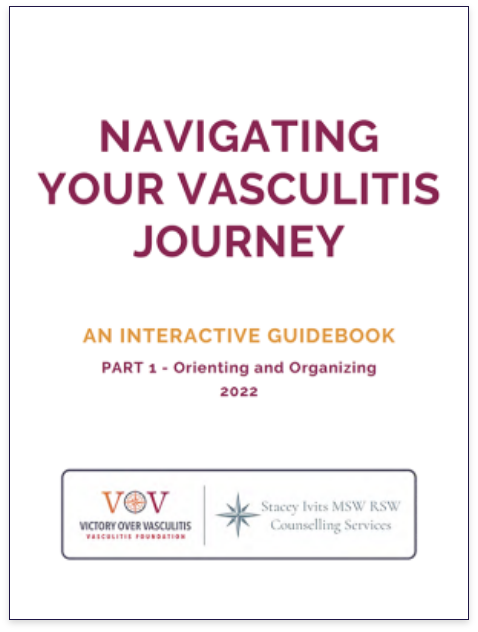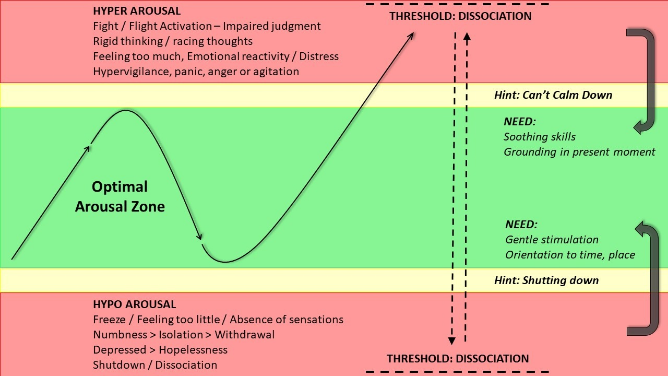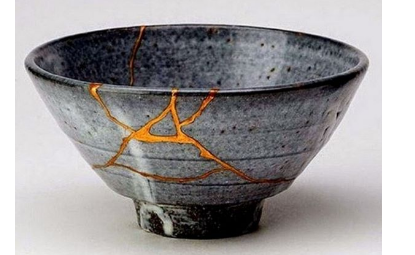Living Well
Mental Health & Mindfulness
You cannot separate your brain from your body. What affects your body also impacts your brain and vice versa. Physical wellness and mental wellness go hand-in-hand. Did you know that research shows that mental health practices such as mindfulness can lower inflammation? This is just one of the many discoveries researchers are making as they look at how our brains and bodies work together to promote health and wellness.
Mental Health & Vasculitis
You knew how vasculitis was affecting your physical health, but you may not have been as prepared for the emotional & mental health impacts of vasculitis. Emotions such as grief and anger are normal reactions to a life changing diagnosis, but as you move forward in your vasculitis journey, it is crucial to learn skills that can help increase your resiliency and improve your mental health.
Vasculits and Emotional Health Part 3
Navigating Your Journey Guidebook & Course
“As a patient with vasculitis I know that there can be an overwhelming number of things to do, information to learn, and appointments to keep to manage health and wellness effectively. As I’ve been living with vasculitis for the past 20 years, I have often wished for a guidebook to help me make my way through all of it. So here I bring together many strategies to help you get organized and plan the next steps in your health journey. This guidebook may not make everything better and it won’t change your diagnosis. However, my hope is that it helps you to find your own way to embrace life, with vasculitis along for the ride.”
– Stacey Ivits
While the guidebook is designed to be self-directed, the Vasculitis Foundation also offers a live, six-week virtual learning opportunity for people who have been recently diagnosed with vasculitis to explore the lessons in the guidebook and learn these tools together.

Working Through the Guidebook
Navigating Your Journey Intro
Navigating Your Journey: Chapter 1
Navigating Your Journey: Chapter 2
Navigating Your Journey: Chapter 3
Navigating Your Journey: Chapter 4
Understanding Your Window of Tolerance
Why is this bothering me?
All of us have a window of tolerance – the zone where we can deal with the stresses of life without becoming upset or checking out. Just like windows come in different sizes, the size of our individual windows of tolerance vary. Some people naturally have a larger window of tolerance than others, and outside factors can also influence our window of tolerance. Things like being hungry or in pain may shrink your window of tolerance; while being on vacation or listening to relaxing music may expand your window of tolerance. Here are some quick tips that might help you get yourself “back in the zone” when you have been pushed outside your window of tolerance.
If you are experiencing hyperarousal (anger/panic) try:
- Deep Breathing
- Soothing Music
- Exercise
- Warm Shower
- Weighted Blanket
If you are experiencing hypoarousal (depressed/withdrawn) try:
- Mindfulness
- Dancing
- Upbeat Music
- Creating-music, art, cooking, building
- Laughter-watch funny videos or your favorite comedy

Want to learn more
- Emotion Regulation 101: Your Window of Tolerance
- Mindfulness and the Window of Tolerance
- Book: Widen the Window: Training your Brain and Body to Thrive During Stress and Recover from Trauma by Elizabeth Stanley
- Podcast: Widening the Window of Tolerance

You Are Strong
“We are stronger in the places we have been broken.”
– Ernest Hemingway
Resource Suggestions
We created these videos, exercise guides, and more for you. Tell us what other information and resources you would find helpful as you focus on physical wellness & movement while living with vasculitis.
Your Victory
Living with vasculitis is a journey, and your strength and energy will wax and wane, but every day holds victories. Tell us about your victories-from holding that new grandbaby to running a 5K-we want to celebrate those moments that bring you joy.







